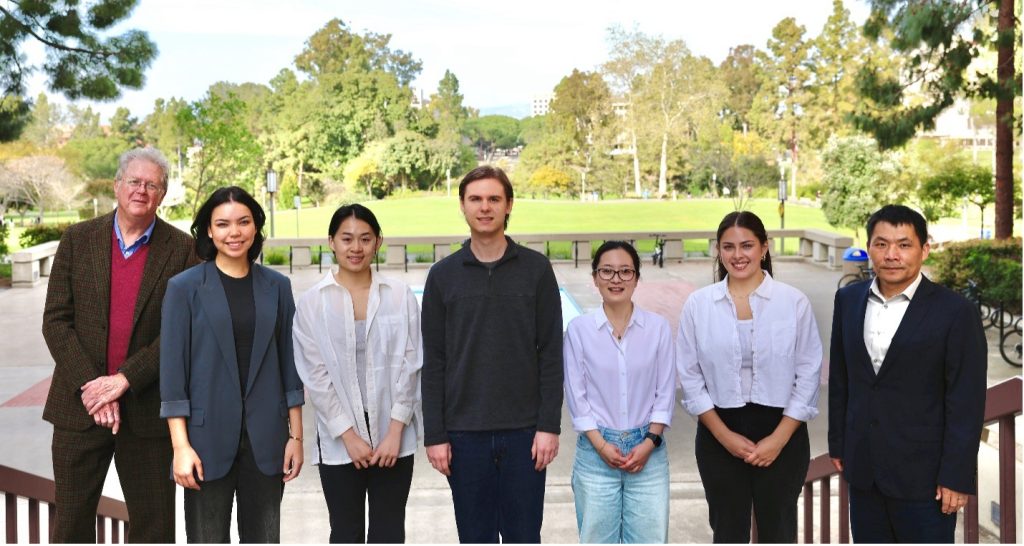Profs. Qing Nie (CMCF), Xiangmin Xu (CNCM) and colleagues discussed the integration of small-scale datasets with each other or with larger reference atlases, particularly in the context of single-cell approaches. Check out our publication titled “Small data methods in omics: the power of one” here.
CNCM Newsletter #2

We’re thrilled to announce the release of our newest newsletter! This edition acknowledges our members’ achievements and highlights what to look forward to this year and beyond. Inside, you’ll find a closer look at our Viral Core updates, upcoming conference and seminar announcements, and more. Dive in to discover what we’ve been up to and how you can get involved!
The full newsletter can be read here.
UC Irvine-led team reveals how TREM2 genetic mutation affects late-onset Alzheimer’s

Irvine, Calif., Aug. 6, 2024 — Researchers led by the University of California, Irvine have discovered how the TREM2 R47H genetic mutation causes certain brain areas to develop abnormal protein clumps, called beta-amyloid plaques, associated with late-onset Alzheimer’s disease. Leveraging single-cell Merfish spatial transcriptomics technology, the team was able to profile the effects of the mutation across multiple cortical and subcortical brain regions, offering first-of-their-kind insights at the single-cell level.
The study, recently published online in the journal Molecular Psychiatry, compared the brains of normal mice and special mouse models that undergo changes like those in humans with Alzheimer’s.
Findings revealed that the TREM2 mutation led to divergent patterns of beta-amyloid plaque accumulation in various parts of the brain involved in higher-level functions such as memory, reasoning and speech. It also affected certain cell types and their gene expression near the plaques.
“Alzheimer’s disease progresses differently in individuals with various genetic risk factors,” said principal investigator Xiangmin Xu, UC Irvine Chancellor’s Professor of anatomy and neurobiology and director of the campus’s Center for Neural Circuit Mapping. “By profiling known mutations, we can develop early, personalized treatments before cognitive decline begins.”
Team members analyzed 19 sections of mouse brains and more than 400,000 cells using a special technique called Merfish to see how they were affected by the Alzheimer’s-related mutations. They were able to examine the expression patterns of genes, providing insight into how they are regulated, contribute to cellular functions and respond to stimuli. Their analysis showed that disparate mutations, like TREM2 R47H, cause changes in the ways microglia and astrocyte cells react to inflammation, as well as how neurons communicate and support brain health.
“Early intervention is key to preventing severe cognitive decline. This is the first study to look at the entire brain at such a detailed level, enabling us to gain a deeper understanding of how the TREM2 R47H mutation impacts gene expression in specific cell types,” Xu said. “These insights can help develop targeted therapies that address these changes and can lead to early intervention strategies that help prevent or slow down the progression of Alzheimer’s disease.”
Read the full article here
CNCM is awarded $1.4 million NIH grant for Alzheimer’s disease research training

The UC Irvine Center for Neural Circuit Mapping has been awarded a five-year, $1.4 million National Institutes of Health T32 grant to establish a training program for Alzheimer’s disease research. The funds will support projects that hold significant promise for clinical translation to the condition, which remains one of our most pressing medical challenges. An interdisciplinary team of 29 faculty members will mentor and support pre- and postdoctoral fellows, employing state-of-the-art approaches to expand the mechanistic understanding of brain disorders through neural circuit mapping. This emerging field is anticipated to drive new therapeutic strategies in the coming decades. “The program will emphasize the development of novel tools and methodologies for early detection, diagnosis and treatment of Alzheimer’s disease and other dementias,” said principal investigator Xiangmin Xu, UCI Chancellor’s Professor of anatomy & neurobiology and director of the CNCM. “Age-related cognitive impairments represent both a major health and socioeconomic concern in the U.S. and globally. The next generation of scientists in this program will lead the charge in understanding and ultimately curing these complex neurological conditions.” Todd Holmes, professor of physiology & biophysics, is co-principal investigator.
Visit the UCI Newsroom Article for more information.
UCI research on the degu Alzheimer’s disease model featured in The Transmitter

Research on the degu (Octodon degus) by members of the CNCM and Xu lab was recently featured in The Transmitter, a neuroscience-focused online publication. Calli McMurray’s piece recounts the history of degus in the study of Alzheimer’s disease, showcases our publication on degu neurodegenerative features, and comments on future directions for the model.
Read the full story here.
UCI researchers identified Alzheimer’s disease brain neural circuit alterations

A new study published in The Journal of Neuroscience by UCI School of Medicine researchers explores how AD affects the brain’s wiring, concentrating on a specific brain area called the subiculum, one of the first brain areas impacted by AD. This opens the door to exciting, innovative treatments for AD that focus on the possibility of repairing impaired brain circuitry rather than changing brain chemistry.
Led by Xiangmin Xu, PhD, a UCI Chancellor’s Professor of anatomy and neurobiology and director of the Center for Neural Circuit Mapping (CNCM), the research team utilized an advanced technique known as monosynaptic rabies viral tracing in a mouse model of AD and normal mice to track how brain connections to the subiculum change with age, as well as between males and females. The study revealed that these connections, particularly those from areas involved in learning and memory, changed differently for males and females and with age, suggesting that AD may disrupt the brain’s networks in complex ways that contribute to memory and learning problems. These findings are in general agreement with the understudied observation that AD impacts male and female AD patients differently.
“Our study is the first to use a novel viral genetic tool to map neuronal circuit changes of the subiculum in AD,” said Xu. “Because circuit defects in AD occur long before symptoms, AD treatments may be more effective by addressing the disease earlier.”

Visit the UCI Newsroom Article for more information.
Study reveals new brain ‘corner’ cells that encode environmental geometry

A research team co-led by the University of California, Irvine, Stanford University and the University of California, San Diego has discovered that there are special neurons dedicated to representing the convex and concave features of environments (commonly referred to as “corners”) in their study of the brain’s spatial mapping system.
The study titled “Subicular neurons encode concave and convex geometries” is published today online in the journal Nature. The discovery was made possible by extensive and close collaboration among Drs. Yanjun Sun (Stanford), Douglas A. Nitz (UCSD), Xu Xiangmin (UCI) and Lisa Giocomo (Stanford). Their findings have implications in understanding how our abilities of spatial navigation and environmental explorations are affected in aging and Alzheimer’s disease.
Read more here: UCI School of Medicine News
UC Irvine-led research team creates novel rabies viral vectors for neural circuit mapping

“A research team led by the University of California, Irvine has created 20 new recombinant rabies viral vectors for neural circuit mapping that offer a range of significant advantages over existing tools, including the ability to detect microstructural changes in models of aging and Alzheimer’s disease brain neurons.
The study published today online in the journal Molecular Psychiatry, introduced proof-of-concept data demonstrating the power of these new vectors, which express a range of improved fluorescent proteins to provide expanded multi-scale multi-modal capabilities. Naturally occurring rabies infections target the nervous system. Scientists harnessed this tendency to create engineered forms of the rabies virus that are coupled to sensors and other payloads – for example, some respond to light by turning bright green and act as tracers that map brain circuits.
‘Viral genetic tools are critical for improving anatomical mapping and functional studies of cell-type-specific and circuit-specific neural networks,’ said Xiangmin Xu, co-corresponding author and UCI Chancellor’s Professor of anatomy & neurobiology and director of the Center for Neural Circuit Mapping. ‘These new variants significantly enhance the capability and reach of neural labeling and circuit mapping across microscopic and macroscopic imaging scales and modalities, including 3D light and X-ray microscopy. We will make these new tools readily available to the neuroscience community through our established service platform at the CNCM.'”
Read more here: UCI News
CNCM Annual Newsletter #1

CNCM has released it’s first annual newsletter! This newsletter covers what we did last year as a center and showcases what there is to look forward to this year and beyond. There is also updates from our Viral Core, Conference Announcements, and Job Listings.
The full newsletter can be read here.
CNCM has been awarded space in the Falling Leaves Foundation Medical Innovation Building opening in 2025!

As announced by Vice Chancellor, Steve Goldstein, MD, PhD, FAAP on January 18, 2024, the Center for Neural Circuit Mapping Translational Neuroscience Program has been named one of the 12 high-impact, interdisciplinary research programs that has been selected for the new building and adjacent space.
“At 215,000 square feet, the building is slated to be the largest interdisciplinary discovery and translational research hub on the West Coast. Scheduled to open in 2025, it is made possible by the extraordinary generosity of Adeline Mah, MD, and Robert Mah, PhD, through their Falling Leaves Foundation.
The Falling Leaves Foundation Medical Innovation Building is an embodiment of our collaborative One Health alliance, bringing together talent from across Health Affairs and attracting new recruits from around the globe. It will empower our clinicians and scientists to cure blindness, unlock breakthrough cancer treatments, revolutionize the treatment of neurological disorders, and harness genetics, proteomics and cutting-edge technologies to treat rare diseases and prevent common illnesses.”
For more information regarding the new project see here.


